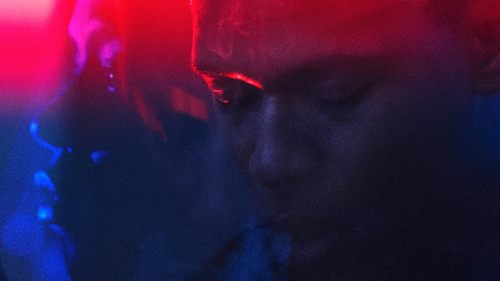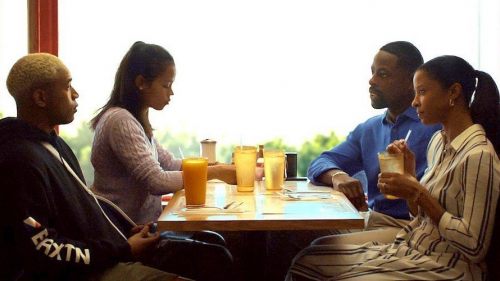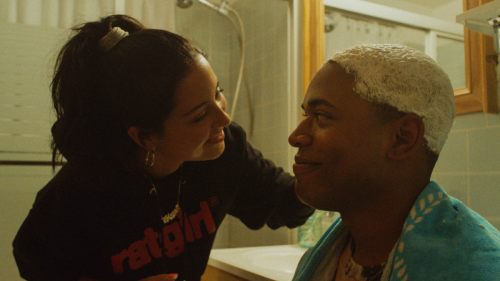What’s The Best Way To Survive An Apocalypse?
Welcome to the latest installment of The Great Debate! This week we have our writers Scott Wampler and Kalyn Corrigan fighting it out in celebration of It Comes At Night (in theaters now!). So here's the discussion: how best to survive the ever-nearer apocalypse? Is it every man for himself or will cooperation be key?
First up, Team Every Man for Himself, aka Scott:
The apocalypse - the end of all things as we know them, up to and including a sizable percentage of the life on Earth - is one of my favorite topics of conversation. It's also one of my favorite things to just sit and think about: will such an event occur within my lifetime? What form might it take? Bombs falling? Climate gone mad? An exceptionally kick-ass (albeit super terrifying) alien invasion? Who will survive, and what will be left of them?
That I would spend so much time thinking about the end of the world should come as no surprise to frequent readers of this site. Y'all know me, know how I earn a livin'. I'm a grouchy, smart-ass misanthrope, distrustful of others and generally annoyed with everything around me. My inclinations run towards the dark and bleak, and that absolutely includes the sort of things I spend my quiet moments daydreaming about. It's just how I'm built.
So, yeah, of course I've spent time considering how I'd navigate an apocalypse. Sometimes I'm certain I'd be one of the first to go, vaporized by a tsunami of fire while obliviously watering the plants in the backyard. Other times I'm convinced I'd last long enough to become a regular fixture on the Wasteland circuit ("Oh shit, here come dat boi Wampler in his tricked-out golf cart, rocking a hockey mask and bondage gear"). Depending on the day, I might not-so-secretly wish for one outcome over another, but if we're here today to talk about the best way to survive an apocalypse, I think the answer is very clear:
It's every man for himself.
Look, I'm not saying that I want everyone to die gruesomely in a global, extinction-level event, and I'm certainly not saying that I'd welcome the opportunity to murder chumps with impunity; Larry David is my real spirit animal, not Lord Humungus. All I'm saying is, when the shit hits the fan, you're gonna have to make a choice between saving as many people as you can...and saving yourself (and your loved ones, of course, assuming they're along for the ride), and I cannot imagine a scenario where trying to make friends with randos in a post-apocalyptic environment doesn't end in disaster. I mean, come on. We've all seen The Walking Dead. And It Comes At Night.
Consider the world around you right now. Start at the ground floor. Think about your least-favorite co-workers. Think about the assholes you encounter on public transit, or in line at the bank, or elbowing past you at the checkout in the grocery store. Now think about the police officers who can't seem to stop murdering people, all the craven local politicians who've built public service careers on a platform of buttfucking the public at every possible opportunity in the name of lining their pockets. Go up a few steps further, to our very own government, which is - at the time of this writing, and probably for some time after that - possibly the most corrupt and cruelly vindictive in our nation's history.
Do you trust any of these people? You shouldn't! But if you do, get ready for a big surprise when The Shit Goes Down™, because the only thing keeping us kinda safe from out-and-out chaos is the very tenuous notion of law and order. Three decades' worth of life on this horrifying planet have taught me that each and every one of these monsters will gleefully line up to rob you blind and spit on your corpse if the opportunity arises, and once that law and order goes away, what do you think is going to happen? Depending on what sort of apocalyptic scenario we're talking about, I'd have no trouble believing that the event itself might end up being only half as deadly as the humans who make it through to the other side.
From where I'm standing, an every-man-for-himself approach is the only thing that makes any goddamn sense. Avoid people, seek shelter (preferably very remote shelter, far from any major highways or big box stores selling chainsaws), fortify your encampment, vigilantly patrol your area, protect what's yours, trust virtual no one. If you wanna survive, that's how it's going to be done, not by hanging around major intersections with a fully-loaded RV, offering medical supplies and canned corn to any Tom, Dick or Harry who wanders up looking to check out your wares. You don't even have to be a raging misanthrope like me to see the logic in this; it's simply common sense.
Of course this isn't the most honorable approach, and it definitely won't win you any humanitarian awards. But guess what? In our brave new post-apocalyptic world, there are no humanitarian awards (at least until I rise to power, at which point the doling out of humanitarian awards will resume, right around the time we open the doors on our first-ever Thunderdome). There won't be much of anything, really, beyond the need to survive at any cost. You can maybe bring a few friends or family members to your brand-new cabin in the woods, but - for the love of god - don't hesitate to leave everyone else on the side of that highway.

Now up! Team Cooperation, aka Kalyn:
It’s easier, isn’t it? Not to let anyone in. To erase the threat of betrayal. To banish the outside world and eliminate the risk of being stabbed in the back. Many people believe that in an apocalypse, the best way to survive is to be a lone wolf. But there’s one major misconception about the forlorn canine who travels unaccompanied through the wilderness which pop culture has conveniently persuaded people to forget – they often die.
Wolves, like people, are meant to travel in packs, and those who choose to go rogue often find themselves knocking on death’s door much sooner than those who elected to engage in companionship. In the utterly intense apocalyptic fever dream It Comes At Night, Paul thinks that he’s protecting his family by staving off stragglers who come stumbling around their little prairie property. In reality, he’s only feeding the paranoia that the end of times has provided, and ensuring that what’s left of his familial unit won’t resemble anything even remotely human – they’ll be nothing more than monsters.
It’s never easy to navigate the proper actions for judgment day, but when it comes time for Paul to tackle the challenge of protecting his family in the aftermath of existence in It Comes At Night, he’s developed a steadfast isolationist policy, and it has worked thus far for he and his crew. That is, until a stranger lets himself into Paul’s home, and he is forced to decide between offering the man shelter, sending him on his way, or taking his life so as to rid the chance of said man altering others to their presence. In the end, Paul chooses to provide the man, now known as Will, along with his wife Kim and child Andrew with board and lodge, but the little voices in Paul’s head keep picking away at him. Bit by bit, nagging at his subconscious, the voices spread rumors through an imaginary grapevine, whispering fervently that he’s made a horrible mistake. He never should have agreed to the outsiders in. You can’t trust anyone but family, just as Paul informs his son Travis, and by opening up their hearts they may have just committed the cardinal sin of allowing vulnerability in a hardened world where only the jaded sustain.
In an apocalypse, we must revert to our animal instincts in order to survive. We must rely on our innate self preservation skills and gut reactions to ensure our safety against the threat of the unknown in order to stand guard against potential predators. Renowned biologist W.D. Hamilton had a great interest in the survival instincts of wildlife, and that’s why in 1971 he produced his ‘Selfish Herd Theory’, suggesting that it’s easier to overcome attacks by outside forces if one seeks shelter within the center of a group. Hamilton illustrated his theory by painting a picture of a small pond in which there resides a large number of frogs and one hungry garden snake. The snake snaps at his prey, causing the frogs to swarm to the outer edges of the water to avert the snake’s assaults, but only the frogs who position themselves between the security of other frogs’ bodies stand the highest chance of living through the peril. The frogs help diminish the danger by surrounding themselves with other frogs. The reason why fish swim in schools, the reason why birds flock together, the reason why wildebeest systematically assemble themselves in a cluster – it’s all just evolution at work. There’s safety in numbers, and in the event of the end of the world, humans should be sticking together too, in order to outlast what’s coming.
It isn’t just animals that benefit from banding together. There’s a reason why a large standing army serves as better defense against the enemy than a single soldier. Loners are easier prey, but people who travel in packs are a little harder to overpower. Having more people on your side provides more opportunities for victory if one should be drawn into possible combat, whether it be because someone steps in to save you, or because with a team at your side, you can shift positions from the prey into the predator with much smoother ease. Now you’re the ones to fear.
There’s not just safety in numbers – there’s strategy too. Alone, one can be perceived as defenseless, but when joined by peers while going up against an oppressor, a multitude of paths suddenly become prevalent – surrounding, dividing, defending, flanking – now the options are limitless, and the outcome is much more in your favor. A warrior with a team at his side will not only stand a greater chance of living longer, but of living a more fulfilled life, as well. After all, there’s a reason why people alone in an apocalypse wind up spending all of their time seeking out survivors. With isolation comes madness, and with madness comes the end of the journey.
Paranoia won’t go away just because you keep yourself locked up and away in a tower of denial and isolation. If anything, the feelings of suspicion and mistrust will only grow stronger and more intense without anyone around. Every little creak of the floorboard, every jangle of a doorknob, each howl of the wind, every menacing glare of the moon – we are creatures of companionship, and spending all of your time alone, especially during dangerous periods of life, can make you see things that aren’t there; hear things that don’t exist. You may live longer, but for how long, and at what cost to your sanity? When there’s no one around to share your joy, are you even really living anymore?
Paul keeps the peace in It Comes At Night by religiously following a daily routine. He, his wife Sarah, and their son Travis take turns doing chores, hunting down food, and spending suppers together. By doing so, they better retain some sense of the lives they once had before the plague came, before the night bled into dark days and the stars themselves hid from the fury of man’s own damnation.
But what would Paul become without his family providing him a notion of normality? Who would he be without his loved ones within reach, his human connection ripped from this realm? The fact is, if doomsday comes around and casts its shadow upon the globe, even if you distance yourself from everyone around you and ensure your own survival, you aren’t even really living life if you are eternally empty of company. If you live out your entire existence alone, you might technically be on this planet for a longer period of time, but the people around you who choose to pair up will live their lives with a brighter flame, albeit on a shorter wick, whereas you might burn longer, but at the price of a duller dim. A shell of a man is no man at all, no matter what he tells himself to sleep through the night. In the end, the fact is that losing your humanity is much worse than experiencing the cold chill of death.
In the 1964 black and white classic directed by Ubaldo Ragona and Sidney Salkow, Vincent Price’s character Dr. Robert Morgan doesn’t wind up earning the title of The Last Man on Earth because he is the only man left standing during the time of total annihilation, he’s the last man on earth because he is the last person alive with his humanity still intact. Although Dr. Morgan manages to find a cure for the virus that’s turning everyone in the world into vampires, he is unable to save the human race because they are too busy destroying themselves. He attempts to tell the few survivors he finds of his discovery of the antivirus, but before he can help them, they stab him to death out of fear, in a church no less, as he begrudgingly deems them “freaks” and declares himself the final true person living on the planet. There might still be other bodies running around on the earth’s surface, but in the absence of benevolence, they are simply no longer human beings.
People in an apocalyptic wasteland tend to think that by refusing quarter to those in need, they’re wisely choosing to survive – but the truth is, once we begin to sever the alliances of our humanity, we lest to be human. We cut the tether to reality. We cease to be. Without love in our lives, we are no longer one of the survivors – we are now just one of the sick.

Now It's Time For Team You Tell Us!
Do you believe in cooperation or self-preservation at the cost of others? Vote, comment, and see It Comes At Night in theaters!



